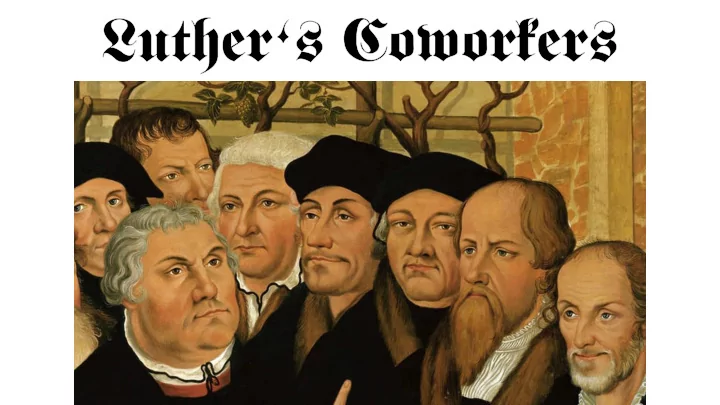

Philip Melanchthon: Luther’s Right -Hand Man
Youth • Family name was Schwartzerd (“Black Earth”) • Child prodigy ➢ Began university at the age of 12 ➢ BA at 14 from University of Heidelberg ➢ MA at age 17 from University of Tubingen ➢ Went to teach at Wittenberg in 1518, taught theology after 1519 • Humanist – classics, rehetoric, education
Melanchthon and Luther • Taught Luther Greek • Assisted Luther at the Leipzig Debate (1519) • Helped translate the Bible • Participated at the Marburg Colloquy (1529) • Represented Luther at the Diet of Augsburg (1530)
As a Reformer • Irenic, great concern to maintain the unity of the church Luther: “Philip also stabs, but only with awls and needles. Such stabs are hard to heal, and they hurt. I, on the other hand, stab with boar spears.” “But regarding the pope, I hold that, if he would allow the Gospel, we could agree to his superiority over the bishops, which he has otherwise taken by human right. This would be for the sake of peace and the general unity of those Christians who are also under him and may be under him hereafter.”
Teaching ability Melanchthon took Luther’s theology and gave it precise and clear definitions that could be grasped by students and pastors. Emphasized system and order to instruct people in God’s Word. Luther: “I cannot combine conciseness and clearness as does Philip.”
Loci Communes (Common Topics) 1521 • First Lutheran dogmatics • Revised by Melanchthon many times • Final 1559 edition was four times the length of the original • The basis of Lutheran theological instruction for generations
Purpose: “There is benefit in having firm and clear testimonies regarding individual articles of Christian doctrine set forth in definite order, as if they were put on a table. Then when our minds are confused or in distress, certain clear statements can be kept in mind which will remove our anxieties, direct our minds, and strengthen and confirm them”
Basis of theology Scripture alone. Philosophy and reason have no place as a source of theology: “The first thing we must know is this, that to seek the will of God without the Word of God or in opposition to it is utterly wrong, for God does not wish us to know Him, neither can we know Him, except through the Word which He has given us, as Scripture everywhere teaches.”
“Just as there are some subjects among Topics treated these that are completely incomprehensible, so there are some that Christ wants every Christian to know most Human Powers (especially free will) Sin intimately….whoever is ignorant of the Law other topics — the power of sin, the Law, the Gospel grace — I do not know how I can call him a Grace Christian. For through these topics Christ Justification and Faith is properly known…to know Christ is to The Distinction between the Old and know his benefits….This, finally, is New Testament and the Abrogation of Christian knowledge — to know what the the Law Law demands, where to find the power to Signs (the Sacraments) fulfill the Law, where to claim grace for Love sins, how to strengthen a wavering soul Magistrates against the devil, the flesh, and the world, Scandal and how to console the afflicted conscience.”
First Lutheran writing on biblical interpretation • Scripture interprets Scripture • The intended meaning of Scripture is based on the grammar. This is the basis of any interpretation • Scripture is united in what it teaches, summarized under the distinction between Law and Gospel • Scripture is clear • Scripture alone is the source and norm of all Christian teaching and the power in the Christian’s life
Melanchthon & the Lutheran Confessions • Two- fifths of the Book of Concord comes from Melanchthon’s pen: Augsburg Confession (1530) Apology of the Augsburg Confession (1531) Treatise on the Power and Primacy of the Pope (1537) • More pages than Luther’s writings • Three of the six authors of the Formula of Concord were Melanchthon’s students (Martin Chemnitz, Nicholas Selnecker, and David Chytraeus)
Augsburg Confession X 1530 1540 ( Variata ) Our churches teach that the body Concerning the Supper of the and blood of Christ are truly Lord, they [our churches] teach present and distributed to those that with the bread and wine the who eat the Lord’s Supper. They body and blood of Christ are reject those who teach otherwise. offered to those who eat in the Lord’s Supper.
Johannes Bugenhagen : Luther’s Pastor
Early Life • Born in Pomerania (modern Poland) • Attended University of Greifswald • Rector of Latin School, ordained a priest • Read Luther’s earliest published writings, became convinced that Luther was right • Went to Wittenberg, studied at the University and became a doctor of theology and served on the faculty
In Wittenberg • Pastor of St. Mary’s from 1523 until his death • First reformer to marry (1522) • Popularizer of the Reformation: could take difficult ideas and make them clear and understandable for lay people • Emphasis on good works as the fruit of faith – education and care for the poor
Reformer of the North Took Luther’s theology and brought it into the forms and structures of congregational life in Saxony and beyond to much of northern Europe • Worship life • Education • Care for the poor
Bugenhagen and Luther • Luther’s pastor • Luther considered him one of the most capable theologians he knew • Ardent defender of Luther’s theology • Preached Luther’s funeral sermon
Johannes Brenz: Reformer and Defender of the South
Early life • Father was a baker • Born near Stuttgart • Studied at Heidelberg • Heard Luther at the Heidelberg Disputation of 1518
As a Reformer • Pastor in Schwäbisch-Hall, introduced the Reformation gradually • Firm supporter of Luther’s theology of the Lord’s Supper against the Reformed • Christian education • Catechism • Sermons • Commentaries • Numerous church orders in Southern Germany
Recommend
More recommend